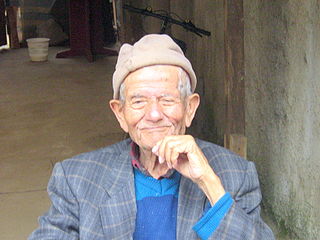Related Research Articles

Nature versus nurture is a long-standing debate in biology and society about the balance between two competing factors which determine fate: genetics (nature) and environment (nurture). The alliterative expression "nature and nurture" in English has been in use since at least the Elizabethan period and goes back to medieval French.

Happiness, in the context of mental or emotional states, is positive or pleasant emotions ranging from contentment to intense joy. Other forms include life satisfaction, well-being, subjective well-being, flourishing and eudaimonia.

Positive psychology is the scientific study of what makes life most worth living, focusing on both individual and societal well-being. It studies "positive subjective experience, positive individual traits, and positive institutions...it aims to improve quality of life." It is a field of study that has been growing steadily throughout the years as individuals and researchers look for common ground on better well-being.
Genetic discrimination occurs when people treat others differently because they have or are perceived to have a gene mutation(s) that causes or increases the risk of an inherited disorder. It may also refer to any and all discrimination based on the genotype of a person rather than their individual merits, including that related to race, although the latter would be more appropriately included under racial discrimination. Some legal scholars have argued for a more precise and broader definition of genetic discrimination: "Genetic discrimination should be defined as when an individual is subjected to negative treatment, not as a result of the individual's physical manifestation of disease or disability, but solely because of the individual's genetic composition." Genetic Discrimination is considered to have its foundations in genetic determinism and genetic essentialism, and is based on the concept of genism, i.e. distinctive human characteristics and capacities are determined by genes.
Genetic epidemiology is the study of the role of genetic factors in determining health and disease in families and in populations, and the interplay of such genetic factors with environmental factors. Genetic epidemiology seeks to derive a statistical and quantitative analysis of how genetics work in large groups.

Well-being, or wellbeing, also known as wellness, prudential value or quality of life, refers to what is intrinsically valuable relative to someone. So the well-being of a person is what is ultimately good for this person, what is in the self-interest of this person. Well-being can refer to both positive and negative well-being. In its positive sense, it is sometimes contrasted with ill-being as its opposite. The term "subjective well-being" denotes how people experience and evaluate their lives, usually measured in relation to self-reported well-being obtained through questionnaires.

Behavioural genetics, also referred to as behaviour genetics, is a field of scientific research that uses genetic methods to investigate the nature and origins of individual differences in behaviour. While the name "behavioural genetics" connotes a focus on genetic influences, the field broadly investigates the extent to which genetic and environmental factors influence individual differences, and the development of research designs that can remove the confounding of genes and environment. Behavioural genetics was founded as a scientific discipline by Francis Galton in the late 19th century, only to be discredited through association with eugenics movements before and during World War II. In the latter half of the 20th century, the field saw renewed prominence with research on inheritance of behaviour and mental illness in humans, as well as research on genetically informative model organisms through selective breeding and crosses. In the late 20th and early 21st centuries, technological advances in molecular genetics made it possible to measure and modify the genome directly. This led to major advances in model organism research and in human studies, leading to new scientific discoveries.

Subjective well-being (SWB) is a self-reported measure of well-being, typically obtained by questionnaire.
Terrie Edith Moffitt is an American clinical psychologist who is best known for her pioneering research on the development of antisocial behavior and for her collaboration with colleague and partner Avshalom Caspi in research on gene-environment interactions in mental disorders.

The World Happiness Report is a publication that contains articles and rankings of national happiness, based on respondent ratings of their own lives, which the report also correlates with various life factors. As of March 2022, Finland had been ranked the happiest country in the world five times in a row.
Melinda Mills, is a Canadian and Dutch demographer and sociologist. She is currently the Nuffield Professor of Sociology at Nuffield College, University of Oxford. Mills’ research spans a range of interdisciplinary topics at the intersection of demography, sociology, molecular genetics and statistics. Her substantive research specializes in fertility and human reproductive behaviour, assortative mating, labour market, life course and inequality.

Elaine Ann Ostrander is an American geneticist at the National Human Genome Research Institute (NHGRI) of the National Institutes of Health (NIH) in Bethesda, Maryland. She holds a number of professional academic appointments, currently serving as Distinguished and Senior Investigator and head of the NHGRI Section of Comparative Genomics; and Chief of the Cancer Genetics and Comparative Genomics Branch. She is known for her research on prostate cancer susceptibility in humans and for conducting genetic investigations with the Canis familiaris —the domestic dog— model, which she has used to study disease susceptibility and frequency and other aspects of natural variation across mammals. In 2007, her laboratory showed that much of the variation in body size of domestic dogs is due to sequence changes in a single gene encoding a growth-promoting protein.

In genetics, a polygenic score (PGS), also called a polygenic risk score (PRS), polygenic index (PGI), genetic risk score, or genome-wide score, is a number that summarizes the estimated effect of many genetic variants on an individual's phenotype, typically calculated as a weighted sum of trait-associated alleles. It reflects an individual's estimated genetic predisposition for a given trait and can be used as a predictor for that trait. In other words, it gives an estimate of how likely an individual is to have a given trait only based on genetics, without taking environmental factors into account. Polygenic scores are widely used in animal breeding and plant breeding due to their efficacy in improving livestock breeding and crops. In humans, polygenic scores are typically generated from genome-wide association study (GWAS) data.
Well-being is a topic studied in psychology, especially positive psychology. Related concepts are eudaimonia, happiness, flourishing, quality of life, contentment, and meaningful life.

Jan-Emmanuel De Neve is a Belgian economist and professor at the University of Oxford where he directs the Wellbeing Research Centre. De Neve is also the KSI Fellow and Vice-Principal of Harris Manchester College. He is best known for his research on the economics of wellbeing which has led to new insights into the relationship between wellbeing and income, productivity, economic growth, and inequality. De Neve is also an editor of the World Happiness Report.

Danielle Posthuma is a Dutch behavior and psychiatric geneticist who specializes in statistical genetics. She is a University Research Chair professor at VU University Amsterdam, where she is also head of the Department of Complex Trait Genetics. She has been a member of the Young Academy of the Royal Dutch Academy of Sciences since 2005. She is known for studying the genetics of psychiatric and cognitive traits, including schizophrenia, neuroticism, Alzheimer's disease, insomnia, as well as genetics of intelligence, which she first became interested in researching in the 1990s. In 2019 Posthuma became a member of the Royal Netherlands Academy of Arts and Sciences.
Wendy Johnson is an American differential psychologist and professor of psychology at the University of Edinburgh. She holds the chair in Differential Development in the Department of Psychology and Centre for Cognitive Ageing and Cognitive Epidemiology at the University of Edinburgh.
The Social Science Genetic Association Consortium, abbreviated SSGAC, is a consortium of scientists dedicated to studying the role of genetics in important life outcomes in the social sciences. It has received media coverage for its research looking for genetic variants associated with educational attainment. For instance, the Consortium's first study, published in 2013, found three such variants in a sample of 101,000 people.
David Alexander Cesarini is an associate professor in the Department of Economics & Center for Experimental Social Science at New York University, a Faculty Research Fellow at the National Bureau of Economic Research, as well as affiliated researcher at the Research Institute for Industrial Economics (IFN). He is an empirically oriented economist with interests in social-science genetics, applied microeconomics and behavioral economics—especially known for his research in genoeconomics and the heritability of economic behaviors and attitudes, such as investing decisions and confidence.

Ann King Cashion is an American nurse scientist specialized in genetic markers that predict clinical outcomes. She is a professor emerita in the department of health promotion/disease prevention at the University of Tennessee Health Science Center. Cashion was the acting director of the National Institute of Nursing Research from 2018 to 2019.
References
- ↑ "Meike Bartels". Amsterdam Public Health. Retrieved 2020-04-30.
- ↑ Kharpal, Arjun (2017-02-11). "A scientist has discovered why happiness might very well be genetic". CNBC. Retrieved 2019-07-09.
- ↑ "Historical table of BGA Meetings". Behavior Genetics Association. Retrieved 2019-07-09.
- ↑ "Genetic variants associated with subjective well-being". Nature Genetics. Retrieved 2020-04-30.